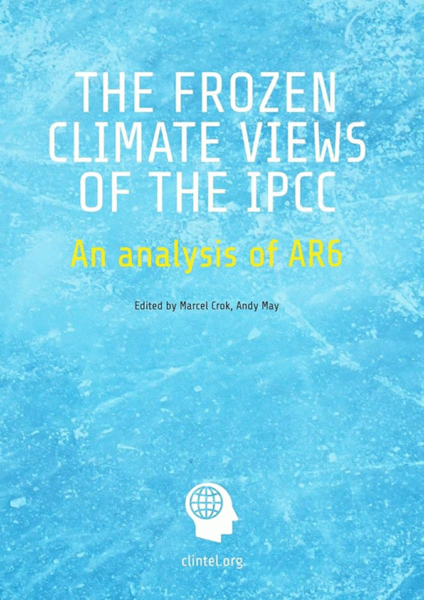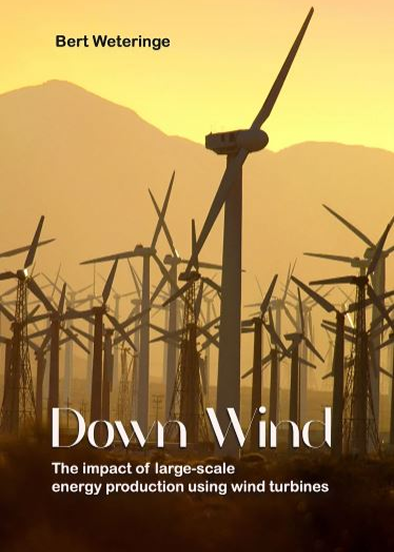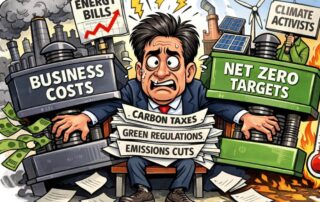Kathryn Porter Warns of Blackouts and Soaring Costs in Britains’ Net Zero Push
In a compelling interview on NTD’s British Thought Leaders with host Lee Hall, independent energy consultant Kathryn Porter paints a stark picture of Britain’s energy landscape, highlighting the severe risks of blackouts and the escalating financial burden of the government’s net zero policies.
Porter, a seasoned expert in the energy sector, argues that the aggressive shift toward renewable energy sources like wind and solar is destabilizing the UK’s electricity grid, increasing costs for consumers, and failing to deliver promised environmental benefits. Her insights, grounded in technical expertise and economic analysis, challenge the prevailing narrative that renewables are a cheap and reliable solution to the UK’s energy needs. The reason for the interview with Porter was the publication of her report The True Affordability of Net Zero. This is how Porter introduces her (independently published) report:
My report reviews in depth the costs of renewable generation and their impact on our bills, driving British industrial electricity costs to the highest in the developed world, and our domestic costs to fourth highest. We’re told this is due to the cost of gas, yet our gas bills are only 15th highest in the world.
The Blackout Risk: A Fragile Grid Under Strain
Porter begins by addressing the looming threat of blackouts, referencing a recent catastrophic event in the Iberian Peninsula, where Spain and Portugal suffered a prolonged power outage that claimed at least seven lives. She attributes this disaster to a grid fault exacerbated by the region’s reliance on wind and solar, which deliver electricity as direct current (DC) rather than the alternating current (AC) for which most grids were designed. This mismatch creates “low inertia,” making the grid vulnerable to faults that can cascade into widespread outages. Unlike conventional power sources like nuclear or gas, which use large, spinning turbines to stabilize the grid, renewables lack the physical momentum to resist disruptions, increasing the risk of collapse.
In Britain, Porter notes a near-miss blackout on January 8, caused not by a grid fault but by insufficient electricity generation to meet demand. She explains that the UK’s aging gas fleet, combined with low wind output and limited interconnector availability, pushed the system to the brink. Interconnectors—cables linking the UK to European grids—failed to deliver due to maintenance schedules and simultaneous shortages in neighboring countries pursuing similar renewable-heavy strategies. Porter warns that as old gas plants retire and renewable capacity grows, the risk of blackouts will intensify, particularly during winter when demand peaks and solar output is negligible.
The High Cost of Renewables: A Financial Burden on Consumers
One of Porter’s most striking assertions is that renewables are not the cost-saving solution they are often touted to be. Contrary to claims that wind and solar are cheap because their fuel sources are free, she argues that their full system costs make them the most expensive form of energy on the British grid. These costs include hefty subsidies, the need for backup generation to cover intermittent output, grid stabilization measures, and extensive infrastructure upgrades to connect remote wind farms to consumers.
Porter highlights the inefficiency of the UK’s renewable strategy with the example of the Seagreen wind farm, which was turned off twice as much as it operated in 2024 due to grid constraints. When wind farms cannot deliver electricity to consumers, operators are compensated for lost revenue under subsidy schemes, forcing consumers to pay twice—once for the gas power that replaces the unused wind energy and again for the idle wind farm. Last year, these “constraint payments” cost £1 billion, a figure projected to rise significantly by 2030.
Moreover, the UK’s aging grid infrastructure, much of it dating back to the 1960s, is ill-equipped to handle the demands of renewable integration. A recent substation fire in West London, which disrupted power to Heathrow Airport and 60,000 homes, underscores the fragility of this legacy system. Porter notes that outdated transformers, operating beyond their capacity, and inadequate protections, like missing blast walls, amplify risks and costs. Upgrading the grid to accommodate renewables requires billions in investment, all of which is passed onto consumers through higher electricity bills.
Porter’s report quantifies the staggering cost of the UK’s decarbonization efforts, revealing that £220 billion has been spent since 2006 with “zero financial benefit.” Even during the 2022 gas price spike triggered by the Ukraine crisis, she argues, the UK would have been better off relying on gas rather than renewables. This challenges the government’s narrative, championed by figures like Energy Secretary Ed Miliband, that renewables will reduce bills by £300 by 2030—a claim Porter dismisses as a “fairy tale” based on outdated gas price assumptions.
Clean Power 2030: An Unfeasible Fantasy
The government’s Clean Power 2030 plan, which aims for 95% zero-carbon electricity by 2030, is a cornerstone of its net zero agenda. However, Porter deems it “almost impossible” due to supply chain constraints, long lead times for equipment like transformers (up to four years), and the sheer scale of infrastructure required. The National Energy System Operator (NESO) estimates that twice as much grid infrastructure must be built in the next five years as in the previous decade—a target Porter considers unachievable given planning and delivery timelines.
The premature closure of coal plants, which could have provided reliable backup, further jeopardizes energy security. Porter argues that the UK’s contribution to global CO2 emissions (0.8%) is negligible, meaning that maintaining a few coal plants would have minimal environmental impact but could prevent blackouts. She criticizes ideologically driven decisions, like Germany’s closure of nuclear plants, which led to increased reliance on high-emission coal, as incoherent and counterproductive.
The Human Cost of Blackouts
Porter underscores the severe human consequences of blackouts, challenging the notion that they are merely inconvenient. The Iberian blackout saw deaths linked to candle-related fires, failed medical equipment like ventilators, and carbon monoxide poisoning from backup generators. In a winter blackout in Britain, she warns, the risks would be even greater, with no streetlights, traffic lights, or heating, leaving vulnerable populations—such as the elderly or those reliant on medical devices—at risk. Unlike the planned rolling blackouts of the 1970s, modern unplanned outages are far more dangerous due to society’s increased dependence on technology.
China’s Role and Ethical Concerns
Porter also critiques the global implications of the green energy push, particularly China’s dominance in renewable supply chains. She notes that China has secured control over critical minerals like rare earths, often through environmentally damaging processes that create toxic waste and threaten water supplies. The UK’s reliance on Chinese-made solar panels, some linked to forced labor in Xinjiang, raises ethical concerns. Porter highlights the Labour government’s initial resistance to banning products tied to forced labor, only relenting after significant backlash. She argues that offshoring manufacturing to China, where energy is cheaper but dirtier, undermines the UK’s net zero goals by increasing global emissions.
A Nuclear Future: Porter’s Solution
If Porter were in charge, she would halt subsidies for wind and solar, ban new wind farms due to their environmental and economic drawbacks, and pivot to nuclear power. Nuclear, she argues, offers high reliability, minimal land use, and no intermittency issues, making it far more cost-effective when full system costs are considered. She dismisses concerns about nuclear waste, noting that modern waste is small in volume and manageable, unlike the toxic byproducts of renewable supply chains.
Conclusion: A Policy at Odds with Reality
Porter’s interview is a sobering critique of the UK’s net zero strategy, exposing its technical, financial, and ethical flaws. She warns that the government’s refusal to engage with dissenting voices and its adherence to an ideological commitment to renewables risk plunging Britain into energy insecurity and economic strain. With public support for net zero waning—evidenced by resistance to policies like the ULEZ (Ultra Low Emission Zones) emissions charge and EV mandates—Porter predicts a potential backlash akin to Brexit. As costs mount and blackouts loom, her call for a nuclear-focused energy policy offers a pragmatic alternative to what she sees as an incoherent and unsustainable path.
more news
Interview with Dr. Guus Berkhout: A Different Perspective on Climate Science and Energy Policy
The big problem today is that climate models are not fit-for-purpose, says Clintel co-founder dr. Guus Berkhout. They do not reflect the real world. That is the reason why the Net Zero policy does not work. We need fundamental changes in climate science and climate policies. We now see that this message gets more and more support.
Judge Rejects Climate Dogma, Begins to Restore Integrity
In a significant move for scientific accountability, a U.S. federal judge has removed a controversial climate change chapter from a key judicial reference manual. The decision challenges the dominance of model-based climate narratives in the courts and signals a renewed emphasis on empirical evidence and institutional integrity.
Ed Miliband is the last fool standing on Net Zero
As the United States moves to reconsider key climate regulations, Britain’s aggressive push toward Net Zero is drawing increasing scrutiny. In this commentary, Matt Ridley argues that unilateral decarbonisation risks leaving the UK economically isolated while much of the world shifts course.





